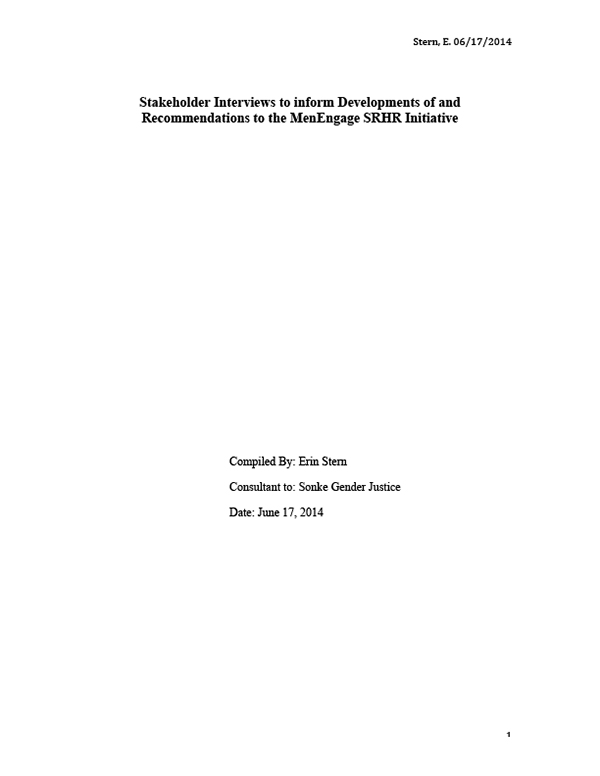- 021 423 7088
- info@genderjustice.org.za
- Whistleblower: 0800 333 059
The following report documents the feedback generated from 28 interviewed stakeholders including funders, researchers, policy specialists, directors, program officers, communication leads, technical advisors, evaluators, and consultants from a variety of regions to inform developments of and recommendations to the MenEngage SRHR Initiative. The stakeholders interviewed had a wealth of experience in SRHR, including in women’s SRHR and access. Expertise in the latter area was critical to privilege a feminist perspective of the initiative and to lay a foundation for meaningful partnership with women’s SRHR efforts. Stakeholders were purposefully recruited through the networks of Sonke, Promundo and MenEngage. The stakeholders interviewed represent those who were available and willing to be interviewed.
Apart from two interviews conducted face-to-face in Cape Town, all interviews were conducted over Skype and telephonically. All stakeholders were sent a copy of the initiative concept note prior to being interviewed. The interviews assessed stakeholders’ opinions and thoughts about the themes, objectives and strategies of the initiative. Interviewees were also asked about the current status of engaging men in SRHR, if the initiative could support their work, the potential impact of the initiative, their awareness of other efforts engaging men in SRHR, strategic opportunities, and any challenges they foresaw the initiative facing. All interviews were transcribed verbatim and analyzed using a thematic approach.
Overall, stakeholders strongly supported and valued the necessity of the initiative. There was much agreement that SRH services, policies and programs engaging men were limited and/or not inclusive of men wanting to be involved. There was general consensus of the need to integrate the initiative with efforts supporting and advocating for women’s SRHR, to promote gender equality by addressing harmful social and cultural norms, and engage with aspects of sexuality and masculinity. Using a human rights and positive sexuality framework, and foregrounding the initiative’s aim to improve men’s SRHR, would be useful to motivate men’s involvement.


Sonke is a South African-based non-profit organisation working throughout Africa. We believe women and men, girls and boys can work together to resist patriarchy, advocate for gender justice and achieve gender transformation.
Please note that Sonke does not offer counselling or other support services to individuals. Click here for information on where to get help.
Sign up for the Sonke e-Newsletter to receive social justice news and views in your inbox.
Please see our Privacy Policy here.